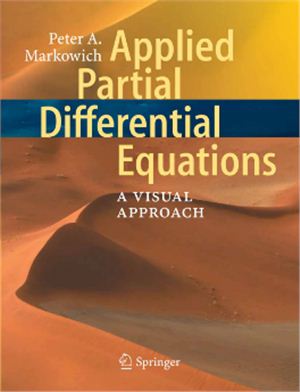Springer, 2006. - 206 pages.
This book presents selected topics in science and engineering from an applied-mathematics point of view. The described natural, socioeconomic, and engineering phenomena are modeled by partial differential equations that relate state variables such as mass, velocity, and energy to their spatial and temporal variations. Typically, these equations are highly nonlinear; in many cases they are systems, and they represent challenges even for the most mode and sophisticated mathematical and numerical-analytic techniques. The selected topics reflect the longtime scientific interests of the author. They include flows of fluids and gases, granular-material flows, biological processes such as patte formation on animal skins, kinetics of rarified gases, free boundaries, semiconductor devices, and socioeconomic processes. Each topic is briefly introduced in its scientific or engineering context, followed by a presentation of the mathematical models in the form of partial differential equations with a discussion of their basic mathematical properties. The author illustrates each chapter by a series of his own high-quality photographs, which demonstrate that partial differential equations are powerful tools for modeling a large variety of phenomena influencing our daily lives.
This book presents selected topics in science and engineering from an applied-mathematics point of view. The described natural, socioeconomic, and engineering phenomena are modeled by partial differential equations that relate state variables such as mass, velocity, and energy to their spatial and temporal variations. Typically, these equations are highly nonlinear; in many cases they are systems, and they represent challenges even for the most mode and sophisticated mathematical and numerical-analytic techniques. The selected topics reflect the longtime scientific interests of the author. They include flows of fluids and gases, granular-material flows, biological processes such as patte formation on animal skins, kinetics of rarified gases, free boundaries, semiconductor devices, and socioeconomic processes. Each topic is briefly introduced in its scientific or engineering context, followed by a presentation of the mathematical models in the form of partial differential equations with a discussion of their basic mathematical properties. The author illustrates each chapter by a series of his own high-quality photographs, which demonstrate that partial differential equations are powerful tools for modeling a large variety of phenomena influencing our daily lives.

